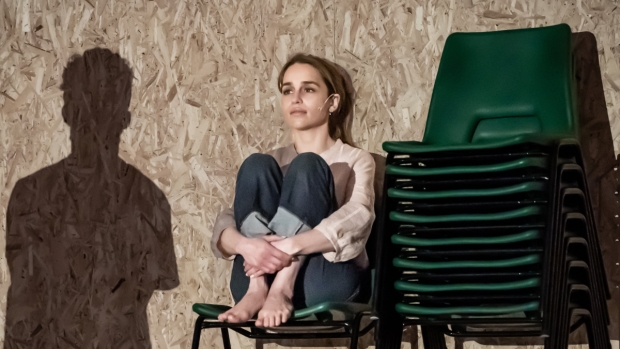The Seagull review – Emilia Clarke makes her West End debut

© Marc Brenner
The Seagull is the latest in Lloyd's season of bold revivals at the Harold Pinter Theatre in the West End, originally planned to open at The Playhouse in 2020. His striking direction here furthers his reputation as the bad boy of the British classical theatre scene, a title which admittedly is not difficult to earn. Known to attract high wattage names to his projects, his latest company member is Game of Thrones star Emilia Clarke who takes on the role of Nina.
Clarke, who makes her West End theatrical debut with this production, shimmers with modest adoration throughout, her expressive brow often upturned with a determined self-deprecation. Usually, plays which feature high profile casting such as this either celebrate the individual's stardom or make heavy-handed attempts to make them indiscernible among an ensemble with demanding, celebrity subverting feats. Here it is the latter, as the company go shoeless and sit together onstage for a quarter of an hour prior to the commencement of the first scene.
Try though the staging might, however, it cannot convince that either Clarke's Nina nor rising star Daniel Monks' tortured Konstantin are the central protagonists of this narrative. Though we do follow the emotional journeys of these two as aspiring actress and cynical playwright, it is the magnificent turn of Clarke's former Game of Thrones co-star Indira Varma as self-indulgent actress Arkadina which steals focus throughout. Varma is delicious in her obnoxiousness and earns plenty of laughs with her delivery of backhanded compliments.
As with most of Chekhov's plays, The Seagull explores themes of isolation, anguish, and devastatingly unrequited love. His work pairs best with a glass of whisky and a helping of existential despair. The last time one of the celebrated Russian playwright's works was at this theatre (Uncle Vanya in 2020) it boasted a stunningly realistic set, while this comparatively sparse design from Lloyd's longtime collaborator Soutra Gilmour is a minimalistic one which closely resembles an enormous chipboard version of an IKEA Kallax.
Regrettably, as with Lloyd's previous production, Cyrano de Bergerac, an engaging and well-paced first act gives way to a sluggish second. One of the most rapt audiences I've witnessed grew restless, spluttering intermittently on their interval wine as they grew increasingly more fatigued by extended, woeful dialogue. Further to this, the audience is ill-equipped to contend with such gravitas, with the play's tone having established itself as more light-hearted. One example of this is Masha's awkward comedy which undercuts the gravity of her subsequent disclosures and makes it difficult for the audience to take her sorrows seriously – though she is superbly portrayed by Sophie Wu.
Audiences facing their first foray into Chekhov needn't fear this production whatsoever. Its stripped back staging and threadbare aesthetic are a carefully calculated choice to amplify the profundity and tenacity of Anya Reiss' feisty, contemporary translation and though the decision to deliver much of the dialogue forwards rather than between the conversing actors diminishes some of the potency of the characters' relationships, the phenomenal acting performances of this universally brilliant company are what endures.












